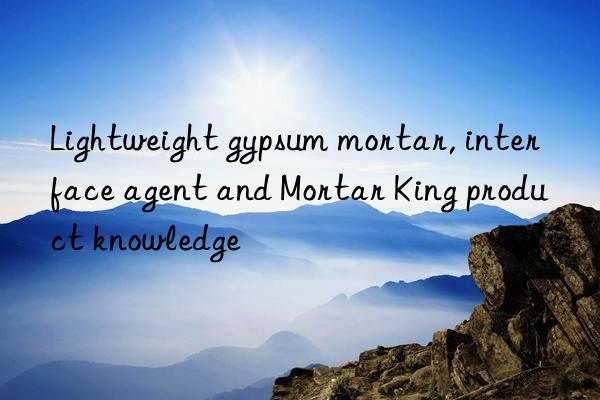
Lightweight gypsum mortar refers to a mortar that is applied on the surface of the base material to protect the base layer and enhance the appearance. Compared with masonry mortar, lightweight gypsum mortar has the following characteristics:
①The plaster layer does not bear load;
② The surface layer and the base layer must have sufficient bonding strength to prevent them from falling off or cracking during construction or under long-term weight and environmental effects;
③The surface layer is mostly thin and applied in layers. The surface layer must be smooth, smooth, meticulous and beautiful;
④Mostly used in dry environments , a large area is exposed to the air.
Classification, performance and application of lightweight gypsum mortar
According to its different functions, lightweight gypsum Mortar can generally be divided into ordinary lightweight gypsum mortar and special-purpose mortar (mortar with waterproof, acid-resistant, thermal insulation, sound absorption, decoration, etc.). Commonly used ordinary lightweight gypsum mortars include cement mortar, lime mortar, cement-lime mixed mortar, hemp lime mortar (referred to as hemp ash), paper-reinforced lime mortar (paper-reinforced ash), etc.
Lightweight gypsum mortar should be firmly bonded to the base surface, so the mortar is required to have good workability and high adhesion. Lightweight gypsum mortar is often applied in two or three layers. The function of the bottom mortar is to firmly bond the mortar to the base layer and should have good water retention. The middle layer is mainly for leveling, and sometimes it can be omitted. The surface layer is mainly used to obtain a smooth and smooth surface effect.
Each layer of plaster has different functions and requirements, and the mortar selected for each layer is also different. At the same time, the characteristics of the base material and the project site are different, and the technical performance requirements of the mortar are different. This is also the main basis for selecting the type of mortar. Cement mortar should be used in damp or high-strength areas; mixed mortar is mostly used for indoor bottom, middle or surface plastering; lime mortar, hemp ash, and paper ash are mostly used for indoor middle or surface plastering. For concrete base surfaces, cement-lime mixed mortar is often used. For the base and surface layers of wooden slats, fiber materials are often used to increase their tensile strength to prevent cracking.
Interface agent is a kind of adhesive, generally made of vinyl acetate-ethylene, which has super strong adhesion, excellent water resistance and aging resistance. . Improving the bonding strength of plastering mortar to the base layer can effectively avoid problems such as hollowing, falling off, shrinkage and cracking of the plastering layer. It is used to treat the surfaces of concrete, aerated concrete, lime sand bricks and fly ash bricks, etc., to solve the problem that the interface is not easy to bond due to strong water absorption or smoothness of these surfaces, resulting in hollowing, cracking, and peeling of the plaster layer. It can greatly enhance the bond between new and old concrete and between concrete and plastering mortar. It can replace the traditional roughening process on the concrete surface and improve the plastering process on the surface of aerated concrete. It is an indispensable supporting material for modern construction and decoration construction.
Interface agents are usually used on concrete surfaces because the concrete surface is too smooth. By using this product, the surface of the base layer can be roughened, which can increase the adhesion of the cement mortar to the base layer. The adhesive force prevents the plaster layer from hollowing out, thus replacing the manual chiseling process. Mortar King is a common name. Some people also call it rock essence, cement plasticizer, etc. It is a substance that acts in cement (cement) to improve the performance of cement mortar and belongs to the category of concrete admixtures. Its main function is to improve the workability and water retention of mortar, improve the efficiency of plastering, reduce floor ash, and save cement and lime paste. It mainly plays the role of diffusing cement, emulsifying and foaming in mortar. It can overcome common problems such as shelling and cracking. It is best to use the base or surface layer on the ground of inflated concrete and ordinary concrete. The mortar in masonry has high fullness. After hardening, it has anti-freeze, water reduction, anti-seepage, durability, and Anti-cracking, heat preservation, heat insulation and other functions.
Mortar King has two main components: one is air entrainment, and the other is thickening. The air-entraining component can be rosin thermopolymer, alkyl sulfonate, fatty alcohol sodium sulfate, etc.; the thickening component can be cellulose, propylene, etc. </p



 微信扫一扫打赏
微信扫一扫打赏
